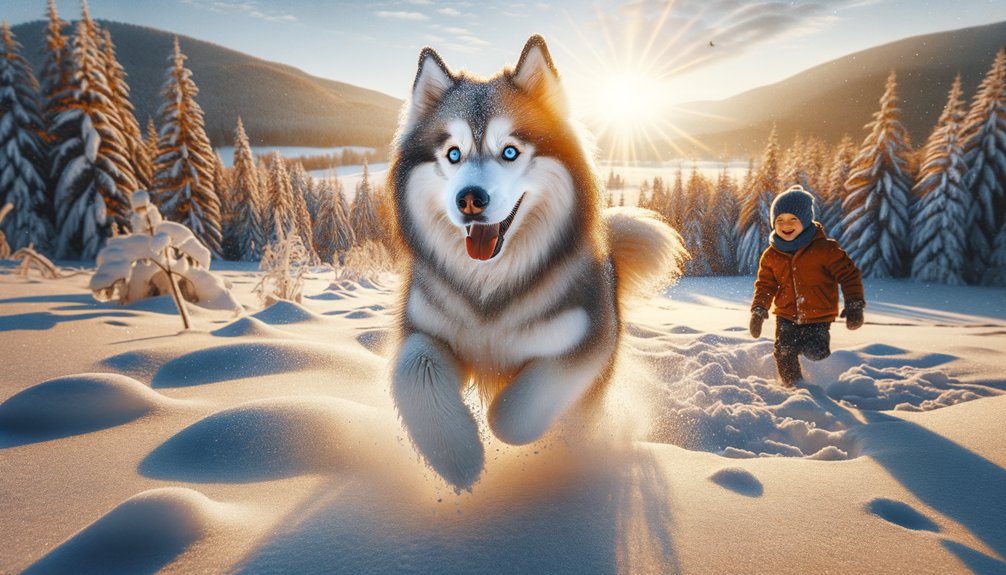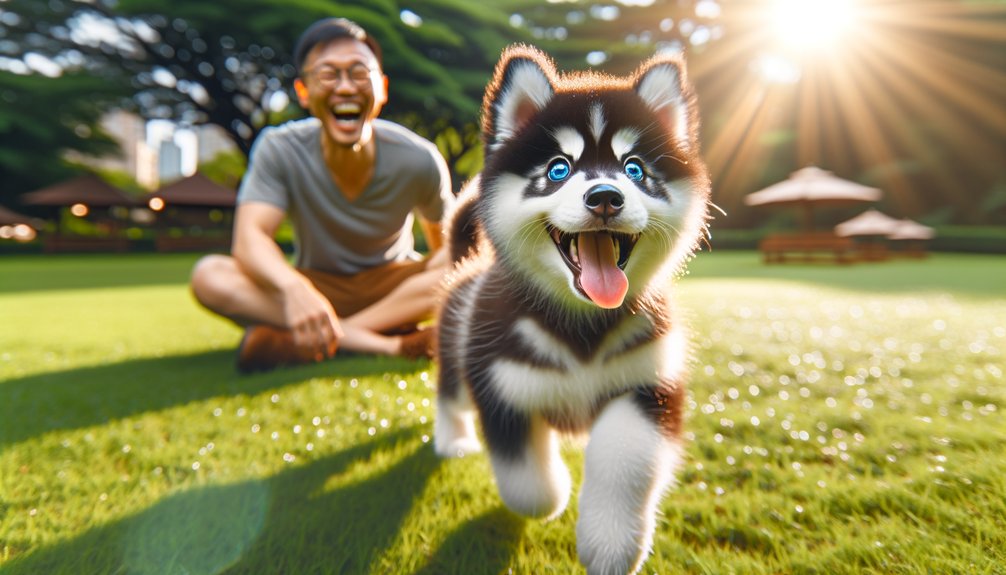AI-assisted
Last updated on June 5, 2025
Have you ever found yourself swept up in common misconceptions about Huskies? While many mistakenly view these striking dogs as merely hyperactive and aloof, the truth is far more nuanced. Digging beneath the surface reveals Huskies as intelligent, social companions who flourish with connection and purposeful activities. By shedding outdated stereotypes, you deepen your bond with your Husky and discover the captivating nuances of their character. What unexpected truths about Huskies are waiting to be discovered?
Key Takeaways
- Huskies are not hyperactive; they require regular exercise to channel their energy effectively.
- Contrary to popular belief, Huskies are affectionate and form strong bonds with their families.
- Their independent nature makes training challenging, but motivation and positive reinforcement can enhance learning.
- Huskies thrive on social interaction and companionship, contrary to the notion that they can be left alone.
- Their intelligence can be misinterpreted as stubbornness; they need mental stimulation to stay engaged and happy.
Separating Misconceptions from Real Experience

When you think about Huskies, it’s easy to get caught up in common misconceptions that don’t reflect their true nature.
Understanding real Husky behavior traits, along with the training challenges you might face, can greatly enhance your experience with this breed.
Common Misunderstandings Explained
While many people admire Huskies for their striking appearance and lively demeanor, several common misunderstandings surround these dogs, often leading to confusion about their behavior and needs.
One prevalent misconception is that their husky energy equates to hyperactivity; however, they simply require regular exercise to channel their liveliness effectively.
Additionally, some believe Huskies are aloof or untrustworthy, but their husky loyalty is profound, as they often form strong bonds with their families.
It’s also assumed that they’re easy to train, which can be misleading; their independent nature sometimes makes training challenging.
Understanding these nuances is essential for fostering a harmonious relationship with a Husky, ensuring both you and your dog can thrive together in mutual respect and companionship.
Real Husky Behavior Traits
Although misconceptions about Huskies abound, a closer examination of their behavior traits reveals a more nuanced understanding of these dogs.
Huskies are known for their playful demeanor, which manifests in their energetic interactions and love for playtime. This trait often leads to the belief that they’re overly independent, but it’s crucial to recognize their pack mentality.
As social animals, Huskies thrive on companionship, both with humans and other dogs. They enjoy engaging in group activities, reinforcing their desire to be part of a family unit.
Their intelligence and curiosity can sometimes be mistaken for stubbornness; however, this reflects their need for stimulation and social interaction.
Understanding these traits can foster a stronger bond with your Husky, enriching your shared experiences.
Training Challenges and Solutions
Training a Husky can present unique challenges that stem from their distinct behavioral traits, particularly their intelligence and strong-willed nature. You may encounter obedience issues, as Huskies often prioritize their own desires over commands.
To effectively address these challenges, implementing motivation methods tailored to your Husky’s interests is essential. Positive reinforcement, such as treats or playtime, can greatly enhance their engagement during training sessions.
Additionally, establishing a consistent routine can help create a sense of security for your dog, which can mitigate stubbornness. It’s important to stay patient and persistent, as building a strong bond through trust will ultimately lead to better training outcomes.
Embracing these solutions can foster a harmonious relationship between you and your Husky, making the journey rewarding.
Actionable Strategies and Practical Tips
Understanding the complexities behind husky stereotypes requires not only recognizing the misconceptions but also implementing effective strategies to address them.
First, prioritize your husky’s exercise needs; these dogs thrive on physical activity, so regular walks, runs, or play sessions are essential to keep them happy and healthy.
Prioritizing your husky’s exercise is vital; regular physical activity keeps them content and healthy.
Next, focus on their socialization needs; exposing your husky to various environments, people, and other animals helps them develop well-rounded temperaments, which counters negative stereotypes.
Additionally, consider joining local husky meetups or training classes, where you can connect with other owners, share experiences, and gain insights.
Finally, educate your community about huskies, dispelling myths by showcasing their positive traits, thereby fostering a more inclusive environment where everyone feels welcome.
Transformative Stories: From Prejudice to Success
Husky stereotypes often stem from misunderstandings that can lead to negative perceptions about these dogs, yet many owners have experienced significant transformations that challenge these prejudices.
You might encounter prejudice stories that depict Huskies as unruly or aggressive, but the success journeys of countless owners reveal a more nuanced reality.
For instance, some have shared how their Huskies, once viewed with suspicion, became beloved family members, showcasing loyalty and intelligence.
These narratives highlight the importance of understanding and patience, illustrating that with proper training and socialization, Huskies can thrive in various environments.



